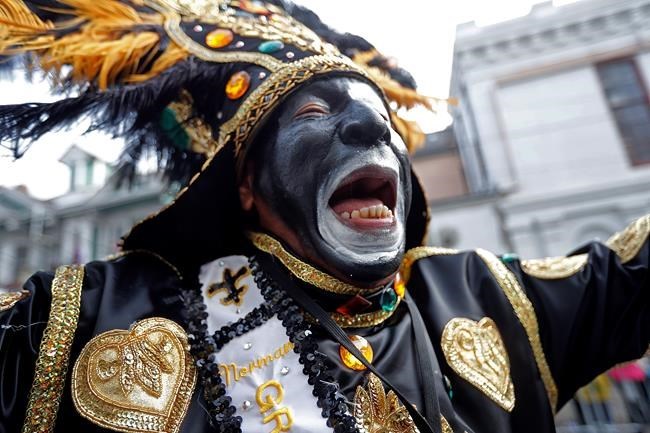
A member of the Krewe of Zulu marches during their parade Mardi Gras day in New Orleans, Tuesday, Feb. 13, 2018. (AP Photo/Gerald Herbert)
Republished February 13, 2018 - 7:29 PM
Original Publication Date February 13, 2018 - 12:06 AM
NEW ORLEANS - Families camped out from early morning to catch beads and stuffed animals thrown from float riders. Revelers took to the streets in elaborate or funny costumes evoking Marie Antoinette, President Donald Trump and glamorous vampires. And amused bystanders took in the chaotic scene from lawn chairs.
Carnival season started Jan. 6 and comes to a close Fat Tuesday with festivities throughout New Orleans. Wednesday marks the first day of Lent, a period of reflection and restraint after the days of parades, parties and revelry.
Throngs of people were on the median for the final day of Mardi Gras, cooking up crawfish and red beans and rice. Others had set up ladders for their kids to sit on and catch beads and throws from the passing Zulu parade, one of two main parades that take to the streets on Fat Tuesday.
Joseph Rhyans moved to Houston in 2002 but tries to come back every year. This time he'd brought two of his kids, one of whom was sitting on a ladder catching bobbles from the passing Zulu parade.
"It's a family thing down here. That is what Mardi Gras is all about. Teach the kids and they will come back every year," he said.
Families usually pack up and go home after the parades are over although celebrations in the French Quarter extend into the late evening before police do a ceremonial clearing of the streets at midnight.
Costumes are a huge part of the Mardi Gras celebrations in the French Quarter, and Tuesday's designs did not disappoint. The French Quarter's most famous street, Bourbon Street, and parallel Royal Street were crowded with costumed tourists and locals, many of them stopping each other for photographs. One group dressed as pink flamingos. Two men, both dressed as Trump, greeted each other in the crowd.
Other costumes included Mr. and Mrs. Potato Head, Pac Man and Mrs. Pac Man and an angel of death with black wings and halo.
Shannon Abraham from Reno, Nevada, said she spent dozens of hours designing and making her elaborate silver-sequined dress. She wore a big silver wig of curls piled on top of curls and a pair of silver fangs to complete her look as a "Glampire Extraordinaire."
"We love New Orleans. There's no place else in the world like it," she said. Speaking of the people dressed up in the French Quarter, she said: "The effort that they've poured into this celebration and their costumes is extraordinary. And I like to be part of that. I like to contribute."
On Royal Street, JoAnn Lemoine, from Marrero, Louisiana, was sitting in a lawn chair on the sidewalk watching the ebb and flow of revelers on the streets. For her, the fun was in the people-watching.
"We love it. We come here every year. This is what we do every year, come out and watch all the people on the streets and all the costumes and this is a good year because all the costumes are out because the weather is so good," she said.
Two shootings near the traditional Mardi Gras parade route left three people wounded, New Orleans Police said. The first shooting happened about 3:15 p.m. Deputy Superintendent Paul Noel said one man was shot in the head and is in critical condition. Another, a juvenile boy, was shot in the leg and is in stable condition.
Police Chief Michael Harrison said a second shooting happened during a fight that broke out. A man who police believe was shot twice was rushed to the hospital. His condition is unknown.
Carnival season draws about 1 million visitors and pumps about $840 million into the city's economy, according to the New Orleans Convention and Visitors Bureau. It also means two weeks of 12-hour, no-vacation shifts for the city's police, who are reinforced by 165 state troopers and officers and deputies from half a dozen nearby areas.
Neighbourhood organizations are among the first groups out on Mardi Gras. There's St. Anne's parade, an eclectic walking parade and the North Side Skull and Bone Gang, which wakes people up and tells children to behave.
The Half-Fast Walking Club, organized by the late clarinetist Pete Fountain, rolls and strolls to the Quarter from the Commander's Palace restaurant.
Then comes the Zulu Social Aid and Pleasure Club, a historically African-American group that parades in blackface and grass skirts. After Zulu comes Rex, which is followed by two "truck parades" with floats built on flatbed trailers and decorated by the families, neighbourhood groups and other organizations riding in them.
The 300th anniversary of this Louisiana port city featured prominently in the Rex parade. Rex, which is the city's oldest parading group, decorated 21 of their 28 floats with images of the city's history.
Although many people associate Mardi Gras with women flashing their breasts for plastic bead necklaces, that bawdiness occurs mostly in the French Quarter, often from Bourbon Street balconies.
Neighbours Christine Stephens and Tracy Thomas said they stay on the traditional parade route, outside the French Quarter.
"Mardi Gras should be for everyone from 8 months to 88 years old," Stephens said.
__
Follow Santana on Twitter @ruskygal.
News from © The Associated Press, 2018